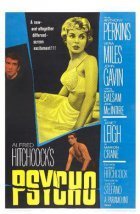
Psycho Page #20
- R
- Year:
- 1960
- 109 min
- 861,065 Views
She starts out of the bathroom. Sam takes hold of her arm,
stops her.
SAM:
You can't go up there.
LILA:
Why not?
SAM:
Bates.
CAMERA STARTS TO PAN AWAY from them, moves slowly over the
room, very slowly.
LILA'S VOICE (O.S.)
Let's find him. One of us can keep
him occupied while the other gets to
the woman.
SAM'S VOICE (O.S.)
You won't be able to hold him still
if he doesn't want to be held. And I
don't like you going into that house
alone, Lila.
CAMERA HAS PANNED clear across to the opposite wall now, and
is moving up closer and closer to the tiny-flowered wall
paper, finally closing in on one small rosebud.
LILA'S VOICE (O.S.)
I can handle a sick old woman.
Now we see that the rosebud has been cut out, that this is
the reverse side of the hole Norman peeped through to watch
Mary. And we see the pupil of Norman's eye now.
SAM'S VOICE (O.S.)
All right. I'll find Bates and keep
him occupied.
The eye moves away and there is a brief flash of light before
the hole is covered, on the other side, by the wall-hung
painting.
FRESH ANGLE - LILA AND SAM
They are about to start out. Sam stops her again.
SAM:
Wait a minute. If you get anything
out of the mother...
(A thought)
Can you find your way back to town?
(As Lila nods yes)
If you do get anything, don't stop
to tell me.
Lila nods quickly, hurries to the door. Sam gets to it first,
opens it a slight crack, looks out, then opens it wide enough
for Lila and Himself to pass through.
EXT. THE MOTEL - (DAY)
ANGLE CLOSE on cabin one as Lila comes out, turns to her
left, goes along porch toward cabin twelve. Sam remains at
the door, then turns right, heading for the path. As he passes
the office, he is shocked to see Norman standing just inside
the open door.
NORMAN:
Looking for me?
SAM:
(Recovering)
Yes, matter of fact.
(The friendly grin)
The wife's taking a nap and... I can
never keep quiet enough for her...
so I thought I'd look you up and...
talk.
NORMAN:
Satisfied with your cabin?
SAM:
Fine.
Sam starts into the office. Just before going in, he glances
down the long porch, sees Lila standing outside the door of
cabin twelve, waves her a tiny "all clear" signal.
LILA:
CAMERA ANGLES to include Lila and her point of view.
She watches Sam disappear into the office, waits until she
hears the door close, then looks about for another way to
reach the house. She sees the small alley at the end of this
L of cabins, starts toward it.
EXT. REAR OF MOTEL - S.C.U. LILA - (DAY)
Behind the motel Lila hesitates. She looks ahead.
LONG SHOT - (DAY)
The old house standing against the sky.
CLOSE UP - (DAY)
Lila moves forward.
LONG SHOT - (DAY)
The CAMERA approaching the house.
CLOSE UP - (DAY)
Lila glances toward the back of Norman's parlor. She moves
on.
LONG SHOT - (DAY)
The house coming nearer.
CLOSE UP - (DAY)
Lila looks up at the house. She moves forward purposefully.
S.L.S. - (DAY)
The house and the porch.
CLOSE UP - (DAY)
Lila stops at the house and looks up. She glances back.
S.L.S. - (DAY)
The CAMERA MOUNTS the steps to the porch.
C.U. - (DAY)
Lila puts out her hand.
S.C.U. - (DAY)
Lila's hand pushes the door open. We see the hallway.
INT. DOWNSTAIRS HALLWAY OF OLD HOUSE - (DAY)
Lila closes the door, remains by it for a moment, quiet,
listening. Her eyes scan the layout, the closed door which
leads off the hallway, to the dining room on the right and
the parlor on the left. Down at the end of the hall is the
kitchen, the door wide open, the room beyond dim and silent.
She notices the stairs leading down to the basement, stares
at them, then back to the stairs leading to the second floor.
She starts forward, and seems about to investigate the parlor
and dining room.
INT. THE MOTEL OFFICE - (DAY)
Norman is behind the counter, standing, staring at Sam who
is sitting relaxedly on a small sofa. Norman has the look of
one who is protecting himself, as if the counter were a
protective wall against the threatening world across it.
SAM:
(Cheerfully, as if
after a self-conscious
pause)
I've been doing all the talking so
far, haven't I?
NORMAN:
Yes.
SAM:
I always thought it was the people
who are alone so much who do all the
talking when they get the chance.
Yet there you are, doing all the
listening!
(A pause)
You are alone here, aren't you?
(As Norman does not
reply)
It would drive me crazy.
NORMAN:
That would be a rather extreme
reaction, wouldn't it?
SAM:
(Lightly)
Just an expression...
(More seriously)
What I meant was... I'd do just about
anything... to get away. Wouldn't
you?
INT. DOWNSTAIRS HALLWAY AND STAIRS OF OLD HOUSE - (DAY)
Lila is halfway up the stairs. As she climbs she is startled
by the creaks and groans of the old wood of the steps. She
steps more carefully. CAMERA remains at foot of stair, TILTING
UP as Lila climbs. She pauses at the head of the stair. The
door on her right, which opens into the mother's room, is
closed. To her left is another door, half-open. Directly
before her is a third door, closed. She holds a long moment,
trying to picture in her mind which room would look out on
the front of the house, decides, chooses the correct door,
the one on her right. She goes to it, knocks lightly.
INT. THE MOTHER'S ROOM (DAY) - CLOSE ANGLE ON DOOR
We hear Lila's second knock, then, faintly, her soft call.
LILA'S VOICE (O.S.)
Mrs. Bates?
There is quiet for a moment, then the door begins to open,
and we see Lila. She stands on the threshold, looking in at
the room, instantly disturbed by it, almost chilled, her
expression indicating an impulse to close the door and go
away from this room forever.
After a moment, she enters, leaving the door open behind
her. CAMERA PULLS BACK AND AWAY and we now see the room as
Lila sees it.
It is ornate, damask-and-mahogany, thick and warm and ripe,
an olla podrida of mismated furnishings and bric-a-brac of
the last century. The bed is four poster, but uncanoped; the
dressing table is fancy and flounced with satin; there is a
great chiffonier, a big-doored wardrobe, a large, oval, full-
length pier-glass (this against the wall directly opposite
the door), a satin recamier, an upholstered armchair by the
window, a white marble fireplace, its grate cold but piled
with ashes.
And there is in the room an unmistakably live quality, as if
even though it is presently unoccupied, it has not been long
vacated by some musty presence.
Lila glances at the bed. The damask coverlet is thrown over
it, but it is not neat, there is the imprint of a body on
it, a body which obviously has slept in a curled-up, womb-
like position. Lila stares at it for a moment, up, then goes
to the dressing table. Its top is scattered with boxes and
jars of cosmetics and creams, traces of fresh powder, an
opened bottle or perfume, a comb, and a brush with traces of
hair in its bristles. Lila moves on, catches a glimpse of
herself in the pier-glass, is startled, turns away, goes to
the chiffonier, is about to open a drawer, sees the high
wardrobe out of the corner of her eyes, goes to it,
hesitantly. She opens one door. Fresh, clean, well pressed
dresses hang neatly. Lila opens the other door. The sweaters
and dresses and robes hang freely, none in moth-proof, storage-
type bags. There is even a well-brushed collar of foxes.
Along the floor of the wardrobe is a line of clean, polished
shoes. Lila stares, then closes the door, turns, looks once
again over the whole room, starts out,
Translation
Translate and read this script in other languages:
Select another language:
- - Select -
- 简体中文 (Chinese - Simplified)
- 繁體中文 (Chinese - Traditional)
- Español (Spanish)
- Esperanto (Esperanto)
- 日本語 (Japanese)
- Português (Portuguese)
- Deutsch (German)
- العربية (Arabic)
- Français (French)
- Русский (Russian)
- ಕನ್ನಡ (Kannada)
- 한국어 (Korean)
- עברית (Hebrew)
- Gaeilge (Irish)
- Українська (Ukrainian)
- اردو (Urdu)
- Magyar (Hungarian)
- मानक हिन्दी (Hindi)
- Indonesia (Indonesian)
- Italiano (Italian)
- தமிழ் (Tamil)
- Türkçe (Turkish)
- తెలుగు (Telugu)
- ภาษาไทย (Thai)
- Tiếng Việt (Vietnamese)
- Čeština (Czech)
- Polski (Polish)
- Bahasa Indonesia (Indonesian)
- Românește (Romanian)
- Nederlands (Dutch)
- Ελληνικά (Greek)
- Latinum (Latin)
- Svenska (Swedish)
- Dansk (Danish)
- Suomi (Finnish)
- فارسی (Persian)
- ייִדיש (Yiddish)
- հայերեն (Armenian)
- Norsk (Norwegian)
- English (English)
Citation
Use the citation below to add this screenplay to your bibliography:
Style:MLAChicagoAPA
"Psycho" Scripts.com. STANDS4 LLC, 2025. Web. 1 Feb. 2025. <https://www.scripts.com/script/psycho_61>.







Discuss this script with the community:
Report Comment
We're doing our best to make sure our content is useful, accurate and safe.
If by any chance you spot an inappropriate comment while navigating through our website please use this form to let us know, and we'll take care of it shortly.
Attachment
You need to be logged in to favorite.
Log In